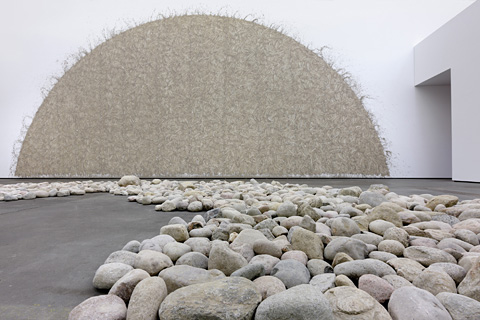Richard Long, who recently turned sixty, has always taken a nomadic approach to the making of art. Sculptor without a studio, he has spent the past thirty-five years and more wandering the landscapes of the United Kingdom, Europe and the wider world, fashioning his work from the materials that he has found, and the words and thoughts that have occurred to him, on his travels. He has drawn inspiration from such widely disparate sources as the Stoic philosophy of the Roman Emperor Marcus Aurelius, according to whom “the universe is one living organism, with a single substance and a single soul”; the poetry of Japanese Zen Buddhists, particularly Basho, master of the haiku, that measured and epigrammatic verse form celebrating the transient beauties of nature; and the lyrics of Country and Western music.
The artist’s works may take the form of texts recording his movements. Others are freestanding sculptures or drawings. And many are photographs, taken with a 35 mm camera, which document ephemeral marks that he has made or temporary structures that he has created in the great outdoors – the visible residue of actions performed elsewhere and now obliterated by time and nature. In 1970, not long after graduating from St Martin’s College of Art in London, he exhibited one such piece called Reflections in Little Pigeon River, Great Smokey Mountains, Tennessee. It consisted of a photograph recording a structure in the shape of a cross which Long had made by placing a number of stones on a shallow river bed in the middle of an American wilderness. To it he appended a verse from a song by Johnny Cash: “I keep a close watch on this heart of mine / I keep my eyes wide open all the time / I keep the ends out...

Richard Long at Haunch of Venison
15-01-2006

